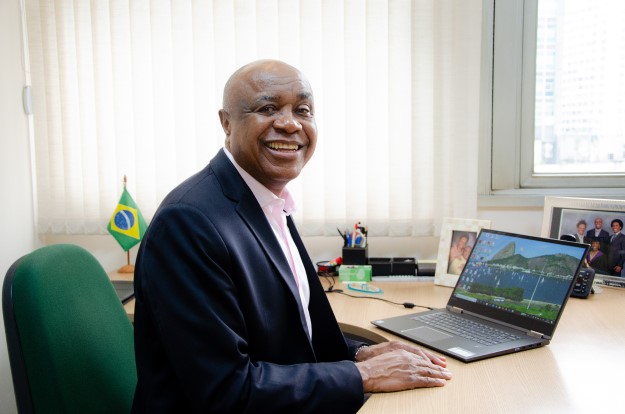RIO DE JANEIRO – Like a postcard, the office window at Nelson Narciso Filho’s consulting firm frames Rio de Janeiro’s cathedral and the statue of Christ the Redeemer. But it’s a picture on his desk that captures the attention of the twelve young people – most of them black and from low-income families – who have gathered for a mentoring session. In the photo, Narciso and his wife pose with their daughter, Thais, at her graduation from her master’s program at the London School of Economics. Their son, Thiago, has also already graduated college abroad. “How did you get this far, sir?” one of the mentees asked Narciso. For these young people, being self-made, successful, and black are things that cannot coexist in Brazil.
Almost 56% of the Brazilian population is of African descent – some 113 million people. Yet, in the corporate world, as in other sectors, the representation of black people is far from proportionate. According to a survey of 117 of Brazil’s 500 biggest companies by the Ethos Institute in 2016, just 4.7% of executive-level posts and 6.3% of managerial positions are held by black people. The statistics are even worse for black women.
“The fact that we’re an exception is an indicator that something is wrong,” the 64-year-old engineer and businessman told AQ.
Narciso is committed to changing this reality. His career trajectory has taught him that businesses have everything to gain from inclusion, and that there are concrete steps that companies can take to shift the status quo. He suggests that companies start by organizing open visits to their premises and inviting black, low-income youth to learn about the business and its needs.
“Many of these young people are studying at technical schools or college, but they don’t have any direct knowledge of the corporate world,” Narciso explains. “How can they dream of joining a company they’ve never even heard of and can’t even imagine exists?”
Narciso also thinks inadequate mangers are keeping many black Brazilians from advancing through their company’s ranks. He suggests training for managers that prioritizes human resources as much as results.
“That way, they can identify the potential of their team and help people grow,” he said.
With a career spanning over four decades in the oil and gas industry, Narciso has held top managerial and executive positions with ABB, Vetco Gray, Hughes WKM, HTR Africa and Halliburton Angola. From 2006 to 2010, he was a director at ANP, the Brazilian energy industry regulatory agency, where he spearheaded an effective reduction in gas flaring from 17% to 3%. Since 2012, he has been president of NNF Energy Consultancy.
Born in Niterói, a city neighboring Rio de Janeiro, Narciso began his career as a lathe operator after taking a couse at Brazil’s oldest naval school, while simultaneously playing soccer for Vasco da Gama, a popular sports club. An accomplished midfielder, he even practiced with the 1974 Brazilian World Cup squad.
Everyone saw a bright future ahead for him. But for a young black man from a poor family, sport shone through as the only, almost inevitable, option. “My family thought the only way we could grow was through soccer,” Narciso told AQ. “But I chose to study.”
“I told my father I couldn’t do both. And he supported my decision,” he said.
In the mid-1970s, when civil and political rights were curtailed in Brazil and even speaking about racial equality was unthinkable, Narciso, just turned 21, took a job as a supervising engineer at the EBIN shipyard. Shipbuilding was his first professional experience, as it had been for his father, an assistant welder.
Narciso credits the mentors that have stepped in his life at different times with helping him move forward. “But how many young people from the periphery, with a great capacity to learn, have the luck of being at the right place and someone noticing them?” he asked a room full of businessmen at a recent event on racial equality organized by Shell Brasil.
Narciso’s climb up the corporate ladder was not without its own prejudice-related challenges. It took him a long time to rise from middle to top management. “Everyone in the company would say I was the most qualified for a job,” but the promotion would only come twenty years later. “Managers in Brazil today must be the vectors for equality,” he said.
Leizer Pereira, a consultant in corporate diversity strategy, says that one of the factors behind the exclusion of black people in selection processes is the persistent concept of “inferiority” that still inhabits managers’ minds leading to discriminatory choices, even when the bias is unconscious.
Then there is also persistent cultural racism. When Narciso, then director of a division, gave a ride to his team – all white – to a conference, the parking attendant asked his subordinate if they needed valet service or if his driver was going to park the car. The moment was an uncomfortable indication of the place still attributed to black people in Brazil.
“For us black people, the door is only ajar,” Narciso spoke to an audience of young people preparing to take the university entrance exam, “but there are ways you can stick your foot in and get through.”
—
Dominguez is a journalist based in Brazil








